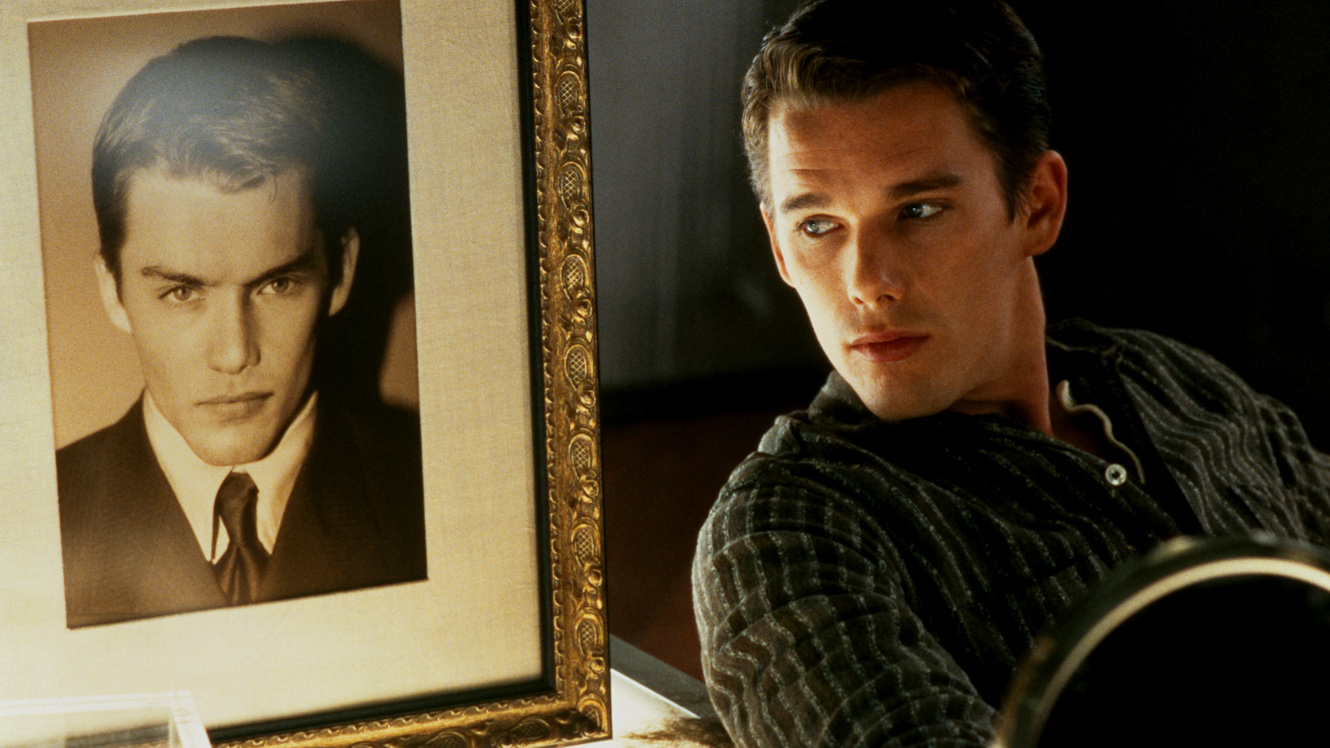Event 2 - Gattaca, May 7th, 12pm
 |
| Vincent, standing next to a photograph of "Jerome," his new identity |
Primarily, because of Vincent’s natural conception, he is replete with many natural disabilities. Born with a high chance of a heart condition, neurological issues, and a shortened lifespan, in this society, it is undoubtable that the protagonist has fewer opportunities in life, such as in occupation and employment. This is particularly troubling for Vincent due to his dreams of a career in space travel at the Gattaca Aerospace Corporation. Yet, due to his genetics, he is forced to remain a mere janitor at this facility. Indeed, his undesirable genetics are further emphasized when compared to his brother, an individual conceived purely through reproductive technologies and who is hence described as genetically superior.
 |
| Jerome drawing out blood for Vincent's genetic profiling tests |
Indeed, this film completely questions and critiques the ethics of biotechnology; particularly, in the art of medicine, it focuses on the morality of choosing an infant’s genetics, a phenomenon called designer babies. Indeed, the film reasons that genetic enhancements exacerbate the already rampant and problematic social inequality. As such, although it mitigates disease and health issues, genetic engineering propagates dangerous notions of eugenics, such as promoting the idea that those who are conceived naturally are genetically undesirable due to their traits and are therefore “invalid.” Moreover, in an article discussing this phenomenon, Bonnie Steinbock mentions that choosing certain traits in a child “demonstrate[s] a kind of desire for perfectionism that seems incompatible with being a good parent” (1295). In fact, this indicates another issue with genetic modification, evident in the life of Jerome. Since he was born as extremely genetically enhanced, deemed the best of the best, while growing he was continuously told that he would go far in life. Indeed, he appears to have fulfilled his destiny as he became a world-renowned competitive swimmer. Yet, in actuality, Jerome was incredibly depressed due to his desire to acquire perfection, and this is evident as he became paralyzed after attempting to commit suicide following a loss in a swim competition. Consequently, the film suggests that genetic modification is entirely problematic from both ends of the spectrum.
 |
| Jerome, indicated as "Valid"... |
 |
| while Vincent is labeled as "Invalid" |
Overall, Gattaca is a film that questions the ethics of genetic engineering by depicting the medical, ethical, and social implications of advanced reproductive technologies (Kim). It is due to this complex critique, and just how much I truly enjoyed the movie, that I would in fact recommend for my classmates to watch it so that they too can consider the implications of biotechnology and whether or not it should become a social norm. Similarly, the questions the film asks should also be addressed within Bioart due to the complex nature of creating living artworks through biotechnology. Not only might there be physical complications due to the unprecedented and unexplored nature of these procedures, but the social, cultural consequences of enacting such techniques and methods may also turn out to be incredibly detrimental for the already marred social inequality of our contemporary society.
WORKS CITED
Ebert, Roger. “Gattaca Movie Review & Film Summary (1997).” RogerEbert.com, www.rogerebert.com/reviews/gattaca-1997.
Kim, Grace. “Gattaca (1997).” The Embryo Project Encyclopedia, 9 Feb. 2017, embryo.asu.edu/pages/gattaca-1997.
Steinbock, Bonnie. “Designer Babies: Choosing Our Children's Genes.” The Lancet, vol. 372, no. 9646, 11 Oct. 2008, pp. 1294–1295., doi:10.1016/s0140-6736(08)61538-x.
Thompson, Janna. “What We Risk as Humans If We Allow Gene-Edited Babies: a Philosopher's View.” The Conversation, 18 Feb. 2019, 2:06, theconversation.com/what-we-risk-as-humans-if-we-allow-gene-edited-babies-a-philosophers-view-110498.
Vaage, Nora S. “What Ethics for Bioart?” Nanoethics, Springer Netherlands, 3 Mar. 2016, www.ncbi.nlm.nih.gov/pmc/articles/PMC4791467/.
IMAGE CITATIONS
Ahuja, Anmol. “Gattaca Ending, Explained.” The Cinemaholic, 29 May 2019, thecinemaholic.com/gattaca-summary/.
Cicutaepisteme. “Gattaca & Bioethics.” The Hypertextual Lounge, 14 Feb. 2017, thehypertextuallounge.com/2017/02/14/gattaca-bioethics/.
“Gattaca - 1997.” SciFiMovieZone.com, www.scifimoviezone.com/gattaca01.shtml.
Sham, Sarah. “Gattaca.” Intro to Mass Media, 7 Oct. 2013, sarahsham.wordpress.com/2013/10/07/gattaca/.
Comments
Post a Comment